Coordinación
Una coordinación sólida puede evitar vacíos y duplicaciones en las respuestas humanitarias, así como garantizar que los PTM complementen otros tipos de asistencia. Sin embargo, el informe del «Estado Global de los Programas de Transferencias Monetarias» de la CALP Network muestra que la coordinación de la asistencia en efectivo es vista como débil y ad hoc, y que esto está teniendo graves repercusiones operativas.
Los donantes, las ONG y los líderes de los grupos de trabajo de transferencias monetarias (GTM) han pedido claridad sobre tres temas principales relacionados con la coordinación de la asistencia en efectivo:
- Quién debe ser responsable de asegurar una coordinación eficaz de la asistencia en efectivo;
- Cuál es la función y el mandato de los grupos de trabajo de transferencias monetarias, incluso en relación con las transferencias monetarias multipropósito;
- Cómo se debe dotar de recursos a la coordinación de asistencia en efectivo.
Tenemos que basarnos urgentemente en lo que funciona y proporcionar claridad a nivel mundial sobre las preguntas arriba mencionadas, adaptándonos a los diferentes contextos. Hace mucho tiempo que se deberían haber tomado decisiones claras basadas en necesidades operativas y no en la política de las agencias.
Prioridades actuales
El objetivo de la CALP Network es contribuir a seguir progresando en este tema en tres niveles: apoyar a los grupos de trabajo de transferencias monetarias a nivel regional; contribuir a soluciones prácticas para la coordinación de la asistencia en efectivo a nivel mundial; y convocar una discusión basada en la evidencia sobre temas clave, destacando puntos de decisión críticos y oportunidades de progreso.
Contenido destacado

Cash Coordination Tip Sheet
Guidelines and Tools
This tip sheet sets out established best practice, key guidance and resources for all aspects of cash coordination, intended as a clear, accessible and action-oriented guide for those engaged in coordination of cash and voucher assistance (CVA) at the field level.

Introducing the Cash Coordination Tip Sheet
Webinar
The CALP Network has developed a tipsheet setting out established best practice and key guidance and resources for all aspects of cash coordination, intended as a clear, accessible and action-oriented guide for those engaged in coordination of cash and voucher assistance at the field level.

Cash Coordination: A proposal from members in MENA
Blog Post
Earlier this year the CALP Network undertook regional consultations to explore options for cash coordination. This blog lays out recommendations from participants from the Middle East and North Africa who sketched out what cash coordination, and coordination more broadly, could look like in future to support a more effective, efficient and accountable response.
Últimos recursos

Social cash transfers, generational relations and youth poverty trajectories in rural Lesotho and Malawi
Report
Report on an ESRC-DFID-funded three-year collaborative research project (ES/M009076/1) Social cash transfer schemes, which disburse cash to poor and/or vulnerable people, have proliferated across sub-Saharan Africa over the past two decades. There is growing evidence that these address symptoms of poverty...

Mitigating Risks of Abuse of Power in Cash Assistance in Afghanistan
Report
This document outlines lessons learned from a joint UNHCR-WFP project in Afghanistan aimed at identifying and mitigating the risks of abuse of power in cash assistance. The cash transfer mechanisms discussed during the mission were cash distribution through Hawalas, mobile token, mobile e-vouchers and...
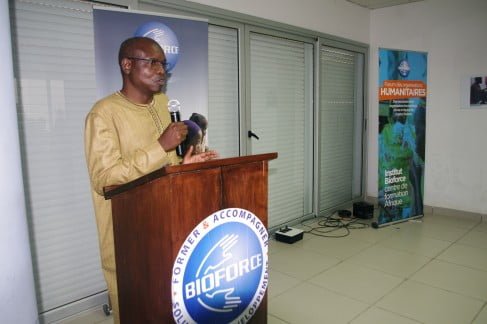
Highlights from Bioforce Institute Graduation Event in Dakar
Blog Post
On Thursday 13th June 2019 the CALP Network was part of a graduation event hosted by the Bioforce Institute, one of our training partner organisations. This event celebrated the graduation of all the Bioforce students that followed the CALP Network’s CVA fundamentals course, which was delivered by our...

Cash Coordination: A proposal from members in MENA
Blog Post
Earlier this year the CALP Network undertook regional consultations to explore options for cash coordination. This blog lays out recommendations from participants from the Middle East and North Africa who sketched out what cash coordination, and coordination more broadly, could look like in future to...

Major Humanitarian Donor Agencies Issue Joint Donor Statement on Cash
News
Senior officials from major donor agencies EU/DG ECHO, Germany, Norway, Sweden, Switzerland, the United Kingdom and the United States of America have released a 'Joint Donor Statement on Humanitarian Cash Transfers', identifying priority areas where donors can improve coordination by focusing on nine...

Highlights from Bioforce Institute Graduation Event in Dakar
Event
On Thursday 13th June 2019 the CALP Network was part of a graduation event hosted by the Bioforce Institute, one of our training partner organisations. This event celebrated the graduation of all the Bioforce students that followed the CALP Network’s CVA fundamentals course, which was delivered by our...
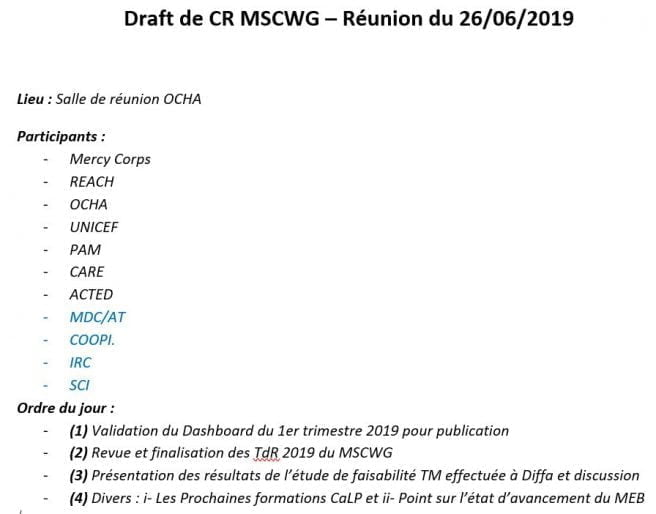
Compte-rendu du Cash Working Group du Niger du 26 juin 2019
Report

How Cash-Based Approaches affect Nutrition Outcomes: Case Studies from World Vision cash programmes in Bangladesh and South Sudan
Report
Case studies South Sudan & Bangladesh – analysis of how different modalities meet their basic needs with flexibility and dignity, esp. contributing to improved nutrition outcomes. Factors such as spending patterns, availability of nutritious food in markets, dietary changes & coping strategies, transfer...

How Cash-Based Approaches Affect Nutrition Outcomes – Guidence Note
Guidelines and Tools
Based on the case studies from South Sudan and Bangladesh, this summary guidance provides advise on use of CVA for improved nutrition outcomes in vulnerable children, emphasising recommendations to ensure that:
– as part of design and targeting, there is improved consideration of nutrition needs in MEB...

Data Responsibility: Let’s not wait for another wake up call
Blog Post
This blog is the second in a series on cash and voucher assistance (CVA) and risk. While the first blog busted some myths around misappropriation and fraud in CVA, this second blog looks into a specific risk for recipients of CVA: the risk of misuse of personal data.
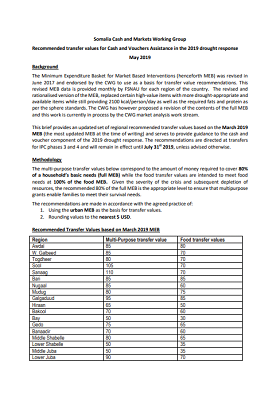
Recommended transfer values for Cash and Vouchers Assistance in the 2019 drought response
Report
This brief provides an updated set of regional recommended transfer values based on the March 2019 MEB (the most updated MEB at the time of writing) and serves to provide guidance to the cash and voucher component of the 2019 drought response. The recommendations are directed at transfers for IPC phases 3...

End-line Survey Report: Cash transfers for rapid livelihoods recovery of volcano-displaced families in Vanuatu
Report
This report documents and analyses the results of an end-line survey of the cash transfer programme (CTP), “Cash Transfers for Rapid Livelihoods Recovery of Volcano-displaced Families in Vanuatu” in Sanma province between October 2018 and March 2019. The programme was implemented by Oxfam in Vanuatu...

Cash and Crises Series Episode 2: The Role of Central Banks in Disaster Management
Video
Watch the video here Cash and Crises is a series of financial literacy audiographics brought to you by CashEssentials, a private sector initiative with a social mission to support the relief and development community in understanding how cash is managed for society in times of crisis. In Episode 2,...

Herramienta De Análisis De La Preparación Organizacional (OCRT)
Guía y herramientas
El presente documento es un diagnostico preliminar que ha sido preparado en coordinación con el Ministerio de Gobernación y Desarrollo Territorial llamado en el documento MIGOBDT, la Asociación GOAL Internacional, llamada para el presente GOAL y el Sistema de Protección Civil, denominado DGPC.
Las...

Market Assessment in Bandua, Inanjou and Buzi
Report
This report presents the outcome of an assessment in three markets following the impact of cyclone Idai. The overall objectives of the market assessment were to understand the functionality of the markets at the current stage and its ability to cater to the increased multi-sectoral needs if vouchers are...
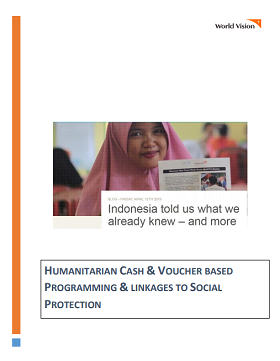
Humanitarian CVA & Linkages to Social Protection – Indonesia told us what we already knew
Report
Case study highlights linkages from disaster-response MPCA in Sulawesi/ Indonesia in 2018 to Child Sensitive Social Protection Programmes – key learnings and best practise. https://www.wvi.org/stories/disaster-management/indonesia-told-us-what-we-already-knew-and-more
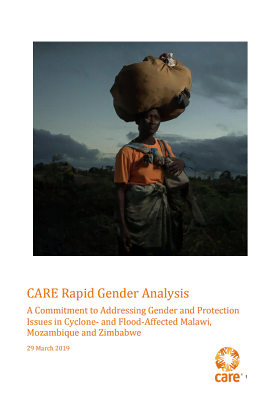
CARE Rapid Gender Analysis – A Commitment to Addressing Gender and Protection Issues in Cyclone – and Flood – Affected Malawi, Mozambique and Zimbabwe
Report
CARE International is responding to the impact of Cyclone Idai and the associated floods in Malawi, Mozambique and Zimbabwe. As part of our response, CARE’s team in each of the countries is currently developing or is planning to develop a Rapid Gender Analysis (RGA) for the affected regions. An RGA...

We Need your Help to Prepare for the Future of Financial Assistance
Blog Post
What role will financial assistance play in meeting the needs of people affected by the crises of tomorrow? Read more about why the CALP Network is launching a collaborative process to try to understand what financial assistance might look like by 2030, and to help actors adapt and prepare for the future.

Cash is no Riskier than Other Forms of Aid. So Why Do We Still Treat In-kind like the Safer Option?
Blog Post
The first in a new series of blogs on cash and voucher assistance and risk, this article from the CALP Network’s Stefan Bumbacher debunks some common myths around the risk of misappropriation and fraud in CVA.

#GenderCash: One year on from the Nairobi Gender Symposium
Blog Post
Together our members and partners have strengthened the evidence base and advanced the debate around gender and cash and voucher assistance. Looking ahead, how can we ensure we turn talk into action to deliver quality CVA for everyone?